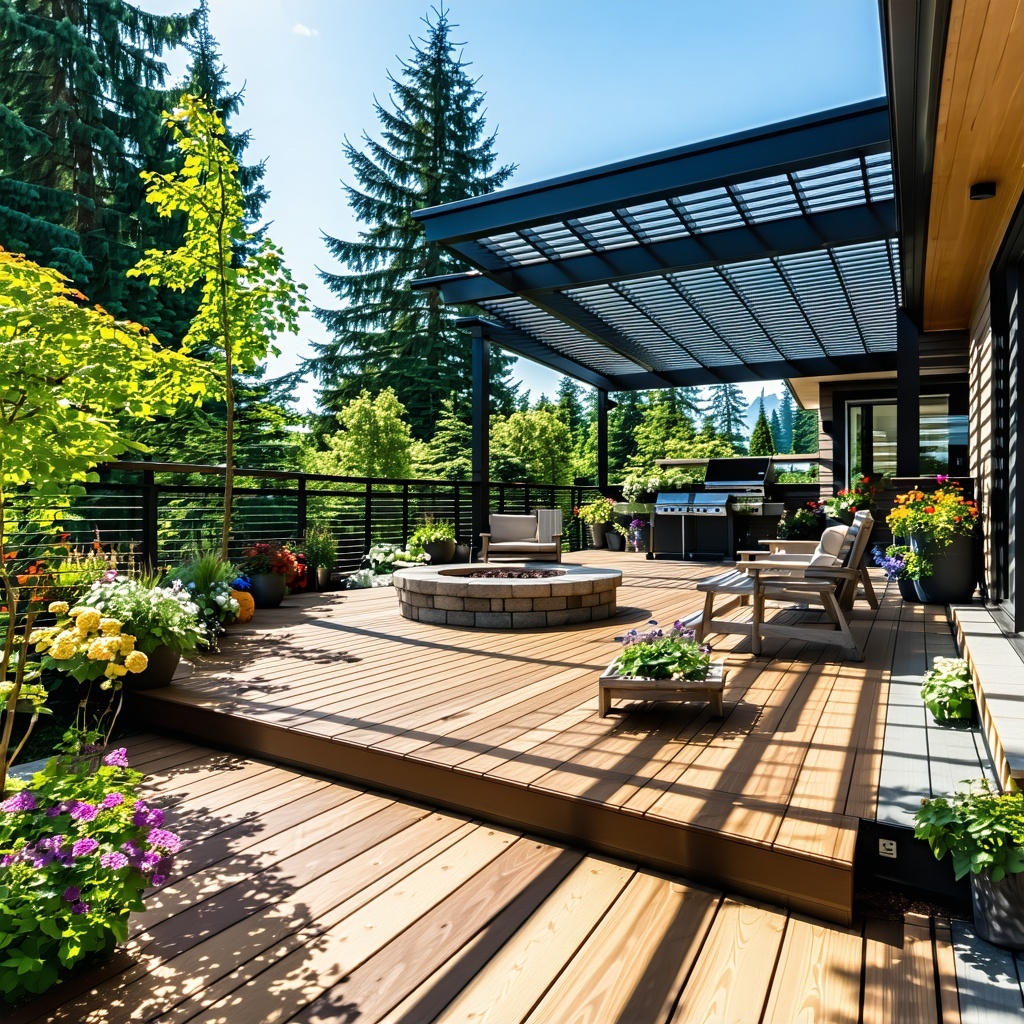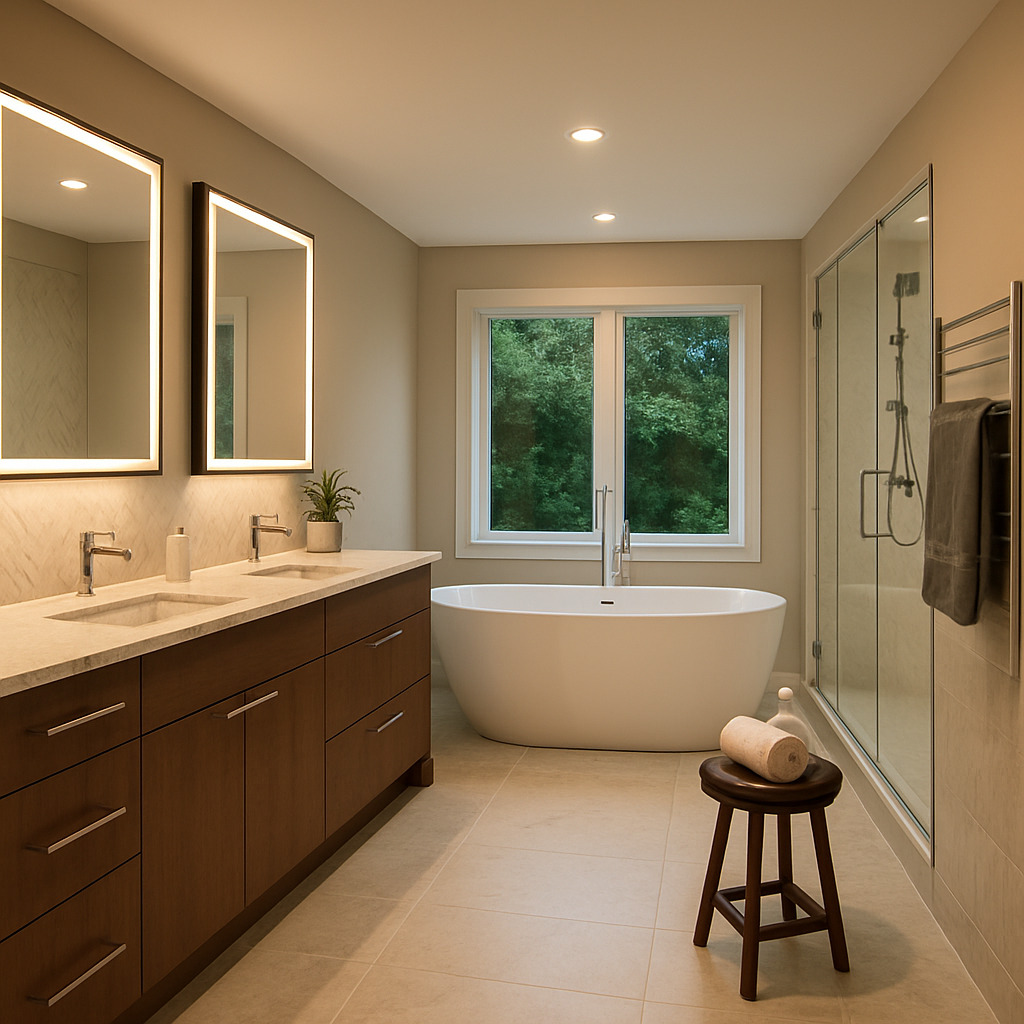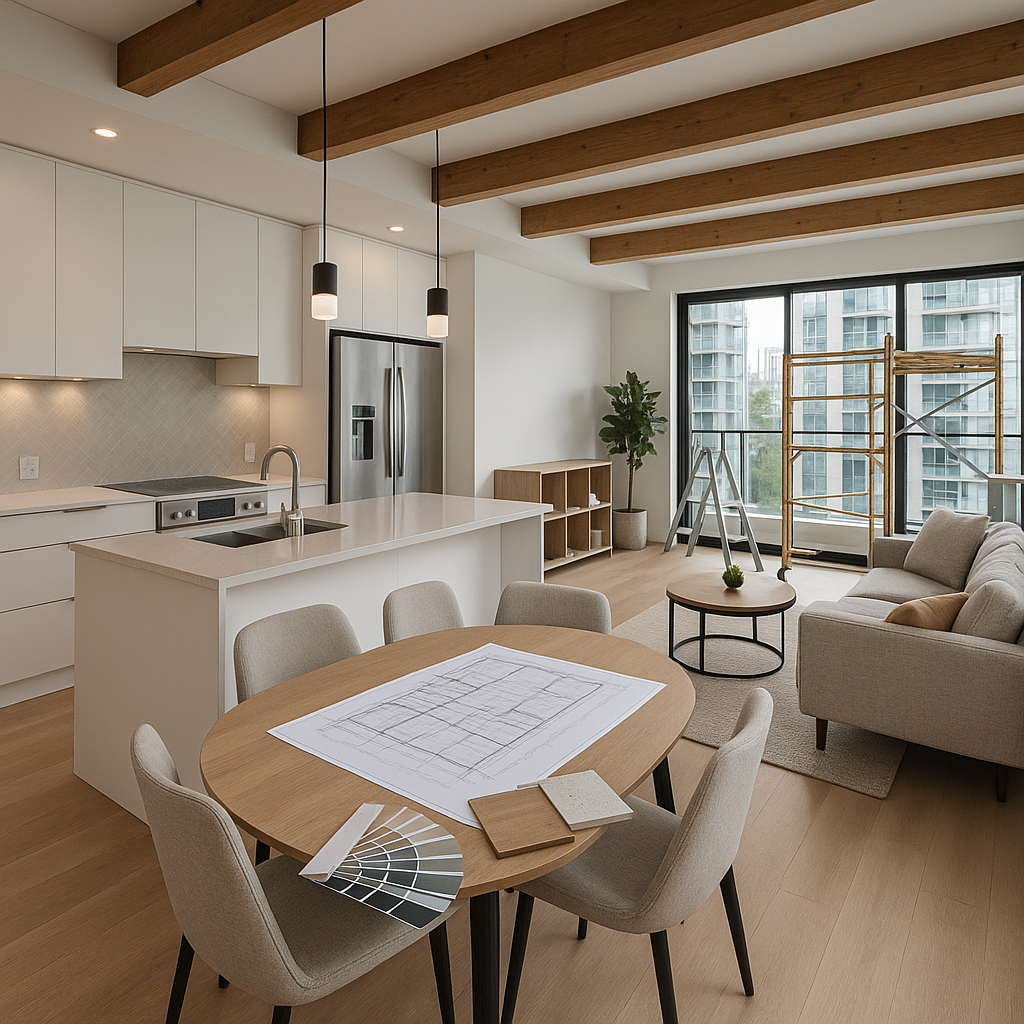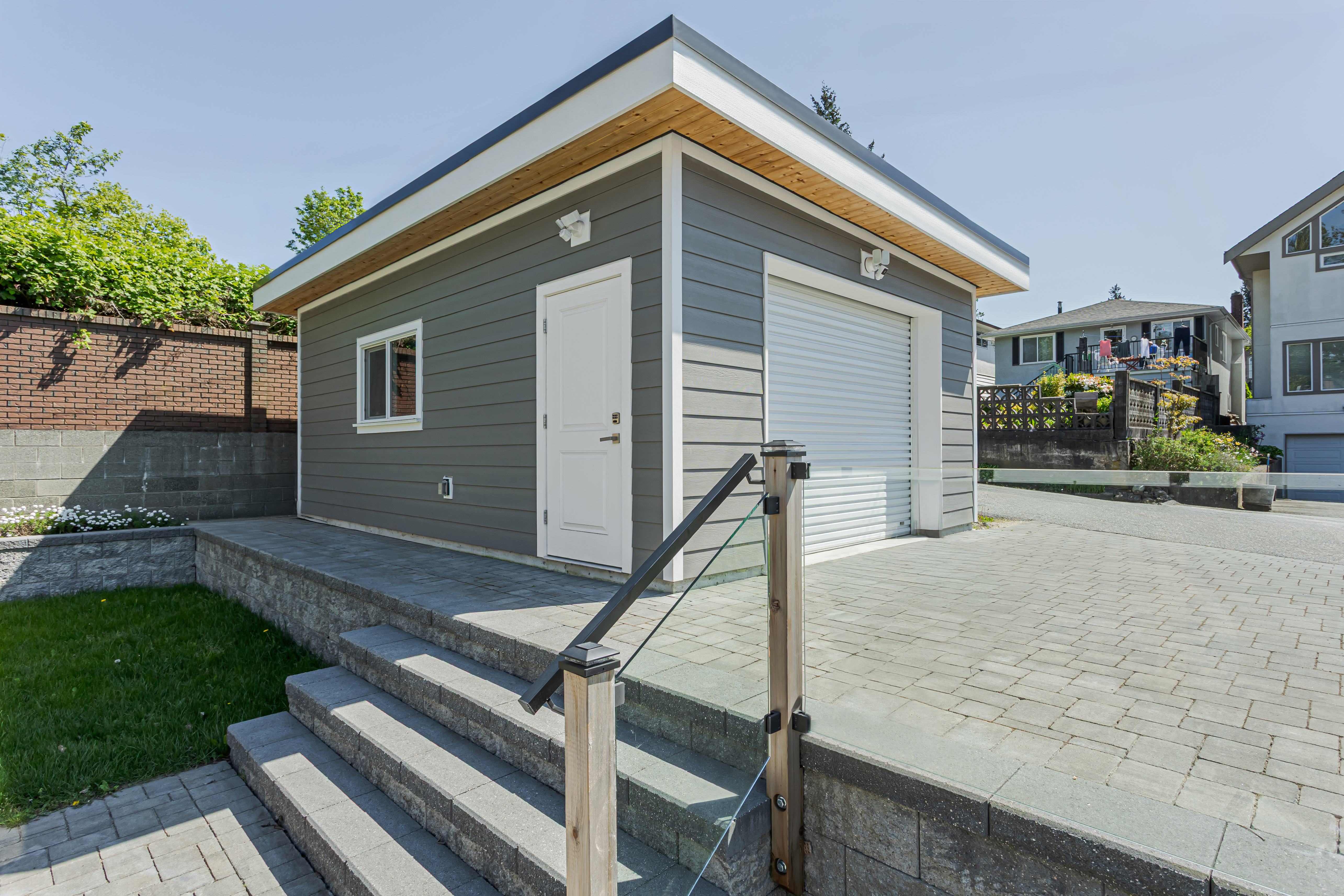Understanding Bathroom Renovation Costs in Vancouver (2025 Guide)
Summary: A bathroom renovation in Vancouver can range from a $15,000 cosmetic refresh to over $100,000 for a high-end custom ensuite. Costs are driven by the...

Summary: Building a deck in Vancouver involves various costs influenced by size, materials, site conditions, and labour. Expect average costs to range significantly, often between $100 to $400 per square foot installed, depending heavily on the chosen surface material. This post breaks down the costs associated with popular decking options like vinyl membranes, tiled surfaces, composite decking, PVC decking, and wood decking, helping you understand the best fit for Vancouver's climate and your budget when hiring a contractor.
.png?width=446&height=446&name=What%20Does%20It%20Really%20Cost%20to%20Build%20a%20Deck%20in%20Vancouver%20(2025%20Guide).png) Dreaming of a beautiful new deck to enjoy Vancouver's stunning, albeit sometimes damp, outdoors? An outdoor living space is a fantastic investment in your home and lifestyle. But the big question looms: what will it cost? Estimating the price isn't always straightforward. Material choices, site specifics, permits, and labour all play a significant role, especially in a market like Vancouver.
Dreaming of a beautiful new deck to enjoy Vancouver's stunning, albeit sometimes damp, outdoors? An outdoor living space is a fantastic investment in your home and lifestyle. But the big question looms: what will it cost? Estimating the price isn't always straightforward. Material choices, site specifics, permits, and labour all play a significant role, especially in a market like Vancouver.
This guide helps homeowners looking to hire a professional contractor. We'll break down the key cost factors and compare popular decking materials suited for our coastal climate: vinyl membranes, tiled surfaces, composite decking, PVC decking, and wood decking. Let’s equip you with the knowledge to budget effectively for your project.
Before diving into specific surface materials, understand that several universal factors impact the final price tag:
Size and Complexity: It's simple: bigger decks cost more due to materials and labour. Complex designs with multiple levels, curves, built-in seating, or intricate patterns also increase costs significantly compared to a simple square or rectangular deck.
Site Preparation: Is your yard sloped? Does land need clearing or leveling? Site prep can add costs ranging from $1,000 to $5,000+ depending on the work required. Proper concrete footings are essential and add to the budget, typically $2,000-$5,000.
Structure & Elevation: The underlying frame, usually pressure-treated lumber, forms the deck's foundation and costs around $30-$50 per square foot. Elevated or second-story decks require more structural support, engineering, and labour, making them considerably more expensive than ground-level decks.
Permits: Most deck projects in Vancouver require building permits, especially if elevated or attached to the house. Fees can range from $250 to $1,500 or more, depending on the municipality and project complexity. Your contractor typically handles this process.
Labour: Professional installation is crucial for a safe, long-lasting deck. Labour costs in Vancouver are generally higher than in rural areas, potentially ranging from $50-$100+ per hour or factored into a per-square-foot installed price. Expect labour to be a substantial portion (40% or more) of the total cost.
Additional Features & Amenities: Beyond the basics, enhancing your deck significantly impacts the cost. Consider elements like:
The choice of decking surface is one of the biggest cost drivers. Here’s a look at popular options suitable for Vancouver:
What it is: A waterproof sheet material (often PVC-based) applied over a solid substrate (like plywood), creating a seamless, watertight surface. Crucially, this creates a complete waterproofing system, meaning the space directly beneath the deck stays dry, which is a major advantage for usable space below elevated decks.
Cost: Installation costs in Vancouver can range roughly from $20 to $35+ per square foot, depending on complexity and the specific product. Some sources place fibreglass (a similar but different category) higher, around $65/sq ft including structure. Waterproofing aspects alone can start around $5,000 for an average deck.
Pros: Excellent waterproofing (essential for Vancouver rain), keeps space below dry, very low maintenance, durable, slip-resistant options available.
Cons: Can have a more synthetic appearance than wood or composite, requires professional installation for watertightness, darker colours can absorb heat.
Best for: Roof decks, balconies, areas needing absolute water protection, creating dry usable space underneath, low-maintenance needs.
What it is: For a high-end deck finish, two primary systems utilize tiles or pavers over a robust waterproofed structure.
Bonded Tiled Decks involve applying a waterproofing membrane (sheet or liquid) over a properly sloped deck. Outdoor-rated porcelain or stone tiles are then installed on this membrane using mortar (thinset) or polyurethane adhesive, and finally grouted. Epoxy grout is often preferred for this over cementitious types because it needs less maintenance and keeps the installation looking newer for longer, which helps create a continuous, watertight surface.
Floating Paver/Tile Decks create a "floating," perfectly level surface using concrete pavers (often 1 1/2"+ thick) or 3/4" outdoor-rated tiles (typically porcelain) set on adjustable pedestals. These pedestals sit on a sloped asphalt waterproof membrane (common on roof decks), allowing drainage through open joints to floor drains or wall scuppers. Larger or thinner materials may require intermediate pedestals for additional support.
Cost: Both are premium solutions. For Bonded Tiled Decks in Metro Vancouver, expect total installed costs from $50-$75+ per square foot, driven by tile material ($4-$30+/sq ft) and specialized setting labor over the membrane. Floating Paver/Tile Decks typically range from $45-$85+ per square foot installed, covering pedestals, selected pavers/tiles (materials $6-$25+/sq ft for tiles), and expert labor; this assumes an existing waterproof membrane.
Pros: Both offer a luxurious aesthetic and very durable surfaces. Direct-adhered systems provide vast design versatility and, with modern methods, prevent efflorescence. Pedestal systems achieve a perfectly level surface over slopes, protect the underlying membrane with easy repair access, ensure superior drainage via open joints, and avoid new surface penetrations into the membrane.
Cons: Both bonded tile systems and pedestal-mounted paver or tile decks represent premium options that involve higher total costs and typically demand specialized installation. Directly adhered tiles require periodic maintenance, especially for grout lines, and using textured tiles is advisable to ensure slip resistance. In comparison, pavers, particularly concrete varieties, may require less frequent cleaning to maintain their appearance than some grouted tile installations. Pedestal systems, whether supporting pavers or thicker tiles, can add significant weight (necessitating robust structural support), increase the overall deck height, and their open joints may trap debris. Furthermore, it's crucial that any thinner 3/4" tiles are specifically rated for use with pedestal systems.
Best for: Homeowners seeking a premium, custom deck. Bonded Tiled Decks suit various decks and patios where a sealed, decorative surface is desired and dry space below is often a goal. Pedestal Systems excel on roof decks and terraces, especially those with parapet walls, where a perfectly level surface, superior drainage, and ongoing membrane access are critical, and where budget and structural capacity permit.
What it is: Boards made from a blend of recycled wood fibres and plastics. Often features a protective "cap" for better durability and stain resistance. Unlike vinyl membranes, standard composite deck boards are installed with gaps to allow water to drain through the deck surface to the ground or area below.
Cost: Material costs range from $10-$20 per square foot. Installed costs vary widely, generally falling between $50 and $100+ per square foot, with higher-end likely in Vancouver due to labour. A mid-range estimate for a 16x20 ft composite deck could be $20,000-$25,000.
Pros: Mimics the look of wood with less maintenance, resistant to rot, insects, and warping, many colour/grain options, good performance in wet climates if installed correctly.
Cons: Higher initial cost than wood, standard installation doesn't create dry space below, can still scratch or stain (especially uncapped versions), some types can fade over time, quality varies significantly between brands. It can expand and contract noticeably with temperature changes.
Waterproofing Option: However, if dry space beneath a composite deck is desired, a separate waterproofing system can be installed on top of the structure before the deck boards. This often involves a torch-on asphalt roofing membrane topped with a rainscreen system (sleepers or specialized pedestals) to elevate the deck boards, allowing drainage between the membrane and the boards. This adds significant cost and complexity compared to standard installation but is a viable option.
Best for: Homeowners wanting a wood-like appearance with significantly less upkeep, suitable for Vancouver's climate (with or without under-deck waterproofing depending on needs).
What it is: Deck boards made entirely from cellular polyvinyl chloride (PVC), containing no wood fibres. Like composite, PVC boards are typically installed with drainage gaps, meaning water passes through.
Cost: Typically costs more than composite decking, ranging from approximately $15 to $25 per square foot or even higher for premium options, installed costs often range from $75 to $125+ per square foot.
Pros: Extremely durable, highly resistant to moisture, stains, scratches, and fading, lowest maintenance requirements, excellent longevity (25-50+ years), ideal for wet environments.
Cons: Highest upfront cost, standard installation doesn't create dry space below, appearance is less wood-like than high-quality composite, some find it feels more "plastic".
Waterproofing Option: Creating dry space underneath requires an underlying waterproofing system (like torch-on membrane and rainscreen/pedestals), similar to composite, adding significantly to the project cost and complexity.
Best for: Maximum durability and minimal maintenance, poolside decks, very wet locations, long-term investment focus (with or without under-deck waterproofing depending on needs).
What it is: Natural wood boards, ranging from locally popular softwoods like Western Red Cedar to dense, durable tropical hardwoods like Ipe (Ironwood) or Teak. Offers classic aesthetic appeal.
Cost: Varies greatly by species. Cedar material runs ~$5-$9/sq ft, while premium hardwoods like Ipe cost ~$10-$25/sq ft. Installed costs reflect this: Cedar might range from $50-$80+/sq ft installed, while Ipe can be $60-$100+/sq ft or even higher for complex projects. Budget options like pressure-treated pine are lower (~$50/sq ft installed) but require the most upkeep.
Pros: Unmatched natural beauty and warmth, some woods (like Cedar) have inherent resistance to rot/insects, tropical hardwoods (Ipe) are extremely dense and long-lasting. Can be finished to preference or allowed to weather naturally.
Cons: Requires regular maintenance (cleaning, sanding, staining/sealing every 1-3 years) to prevent rot, decay, and maintain appearance, especially in Vancouver's wet climate. Annual wood deck upkeep can cost $300-$800. Can splinter (less common with dense hardwoods). Premium hardwoods are expensive and harder to install. Environmental sourcing concerns for some tropical woods (look for FSC certified).
Waterproofing Option: Standard installation allows water drainage through gaps. Achieving dry space below requires adding an underlying waterproofing system (like torch-on and rainscreen), similar to composite/PVC, at extra cost.
Best for: Those prioritizing the look and feel of real wood and who are committed to performing regular maintenance. Cedar is a common local choice balancing aesthetics and properties; Ipe is a premium choice for ultimate durability in wet conditions.
Vancouver's rainy climate demands materials that handle moisture well.
Top Performers for Rain: Vinyl membranes and PVC decking offer the best inherent surface water resistance. High-quality capped composite decking also performs very well when installed correctly with proper gapping for drainage. Tiled decks require meticulous, professional waterproofing underneath to succeed long-term here.
Dry Space Below?: Consider if you need the space under your deck to be dry for storage or living area. Vinyl membrane provides this inherently as a complete waterproofing system. For composite or PVC decks, achieving a dry under-deck area requires an additional, often costly, waterproofing layer (like torch-on) installed on the structure beneath the boards.
Balancing Factors: Your choice involves trade-offs:The Contractor Factor: Regardless of material or system (surface waterproof like vinyl vs. under-board waterproof like torch-on), proper installation is critical in Vancouver. Ensure your contractor has experience with your chosen system and understands best practices for flashing, drainage, slope, and material integration in our climate.
Building a deck in Vancouver is a significant investment, with costs varying based on size, design complexity, site conditions, and material choices. Whether you opt for the complete waterproofing of a vinyl membrane ($20-$35+ per square foot installed), the custom look of tile systems ($45-$85+ per square foot installed), the low-maintenance wood look of composite ($50-$100+ per square foot installed), the ultimate durability of PVC ($75-$125+ per square foot installed), or the natural beauty of hardwood (ranging from $50-$100+ per square foot installed depending on species, with premium options potentially higher), understanding the pros, cons, costs, and maintenance involved is crucial.
Understanding the differences, especially regarding waterproofing needs (surface vs. under-deck systems) and whether you require dry space below, is key.
Ready to build your dream deck? Contact us today for a personalized consultation and detailed quote. Let our experienced team help you choose the right materials and design for your beautiful, long-lasting Vancouver deck.
Insights and inspiration for Better Living Spaces


